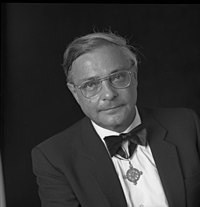Werner E. Reichardt
| Werner Ernst Reichardt | |
|---|---|

Werner Reichardt, 1982
|
|
| Born |
30 January 1924 Berlin, Germany |
| Died | 18 September 1992 (aged 68) Tübingen, Germany |
| Residence | Germany |
| Nationality | German |
| Fields | Cyberneticist, physicist, biologist |
| Institutions | Max Planck Institute for Biological Cybernetics |
| Alma mater | Technical University of Berlin |
| Doctoral students | Hendrik Eckert, Martin Egelhaaf, Jutta Strebel, Renata Virsik, Hermann Wagner, Christian Wehrhahn. |
| Known for | Reichardt detectors |
Werner E. Reichardt (30 January 1924 – 18 September 1992) was a German physicist and biologist who helped to establish the field of biological cybernetics. He co-founded the Max Planck Institute for Biological Cybernetics, and the Journal of Biological Cybernetics.
As a young student, Werner Reichardt was a pupil in the laboratory of Hans Erich Hollmann, a pioneer of ultra-shortwave communication. Because of his knowledge he was drafted in 1941 to the German air force as a radio technician. There he came into contact with resistance elements, and built a secret radio link with the Western Allies. In 1944 Reichardt was arrested by the Gestapo and sentenced to death, but escaped, and hid in Berlin until the end of the war.
From 1946 to 1950 he studied physics at the Technical University of Berlin. From 1950 he was a doctoral student of Ernst Ruska, studying solid state semiconductors at the Fritz-Haber-Institut of the Max-Planck-Gesellschaft, and received his doctorate in 1952. From 1952 to 1954 he was an assistant at the Institute where his teacher Max von Laue was a large influence to his later research. During the war, Reichardt had known Bernhard Hassenstein, who had studied otptomotor turning behaviour after the war. Realising these experiments could be formalised in a similar way to electronics experiments, he developed interdisciplinary theories of motion perception. In 1954, Reichardt became a Postdoctoral Fellow at the California Institute of Technology at the invitation of Max Delbrück. From 1955 he was assistant at the Max Planck Institute for Biophysical Chemistry in Göttingen under Karl Friedrich Bonhoeffer. In 1958 he founded together with Bernhard Hassenstein and Hans Wenking the cybernetics research group at the Max-Planck-Institute of Biology in Tübingen. In 1968 the department was transformed into the independent Max Planck Institute for Biological Cybernetics.
...
Wikipedia
